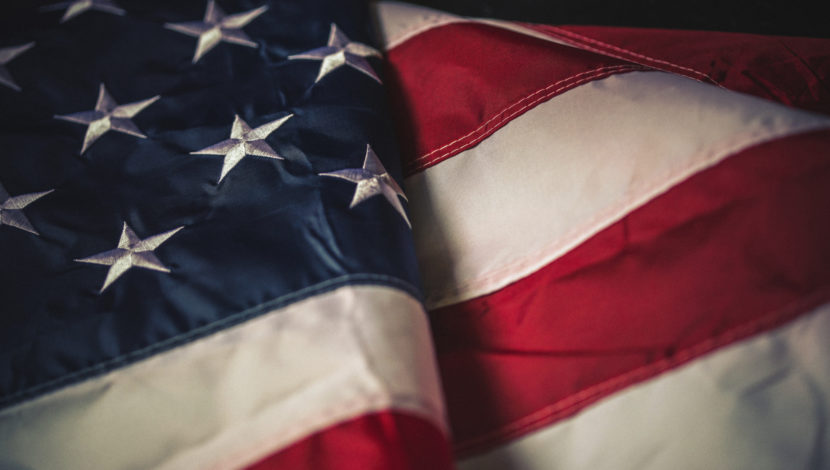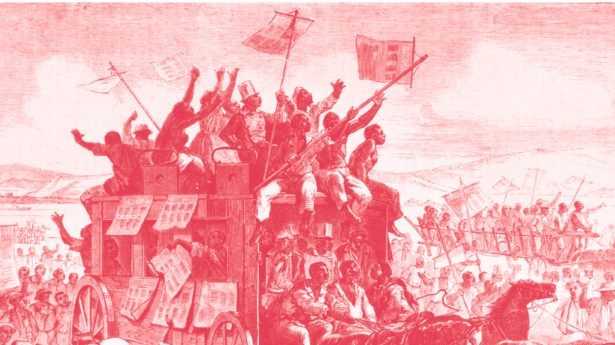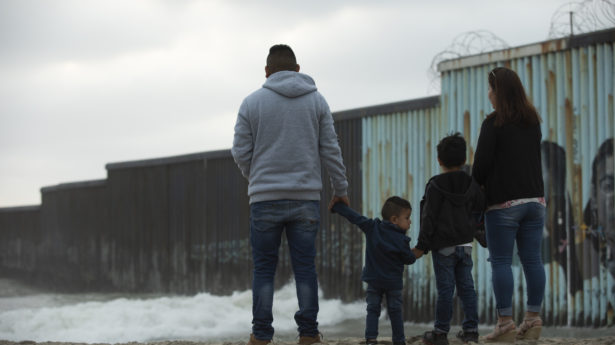The Unitarian Universalist Service Committee advances human rights through grassroots collaborations.
Independence Day: 3 Ways the US Can Protect Our Freedoms

By on July 3, 2022
While July 4 may mark the “independence” of the 13 colonies from British rule, the Declaration of Independence—and America—never truly embraced the concept of freedom in its purest form: particularly when it came to slavery and the oppression of Black men, women, and children.
“Independence” is defined as, “freedom from the control, influence, support, aid, or the like, of others.” Yet, if we think about it, there are many people in the United States who cannot really proclaim their independence, especially in terms of personal freedoms.
There are many ways the United States can do better when it comes to living into—and fully embracing—the concept of independence. Here are three ways the United States can promote independence for all:
Protect the Right to Reproductive Freedom
The recent decision by the U.S. Supreme Court to overturn Roe v. Wade is a tremendous setback for the nation. The right to make choices concerning one’s own body is sacrosanct—there is no doubt that the court’s decision is rooted in ignorance, religious conviction, and misogyny. As we protest and devote our collective outrage towards the regressive decision making of the Supreme Court, we cannot lose sight of the fact that this nation prides itself on the idea of freedom. The paradox of proclaiming itself as a democratic nation that upholds the principles of individualism and personal freedom while making a national decision to police the bodies of women from coast to coast is one that we should never lose sight of.
Stories like that of a 10-year-old victim of rape forced to cross state lines to end her pregnancy is just one example of how utterly cruel and senseless this country can be. The decision to protect access to abortion and other reproductive services will now fall on individual states. Women and girls will be forced to make unnecessary journeys across state lines just to exercise their right to make decisions about their own bodies. Where, exactly, is the “freedom from the control, and influence” of others that the word “independence” conveys? Can we really celebrate Independence Day when women and girls are told that they’re not truly independent after all?
Ensure the Immigration System Serves Everyone Equitably
The unprovoked invasion of Ukraine by Russia in early February introduced the world to another highly visible conflict between two nations. As with any other conflict—whether human-made or natural—striking forms of oppression rose to the surface for all to see. For example, immigrants of color in Ukraine were given second-class status when it came to efforts to transport civilians out of the nation. These immigrants were told that emergency services to help people flee the violence was for “Ukrainians” (another word for White people). Sadly, it’s been reported that animals were allowed on trains leaving the country before African students.
The United States treats its immigrants no differently. Fifty-six days after Russia invaded Ukraine, the Biden administration launched its “Uniting for Ukraine” initiative to help welcome and relocate Ukrainians in the United States under a humanitarian parole program. While the administration’s creation of this program is admirable, its provisions are much more lenient and welcoming than the humanitarian parole program for Afghanis. Created in response to the U.S. withdrawal from Afghanistan, the criteria are quite strict. As of late April, a whopping 87% of applications for the Afghanistan humanitarian parole program have been denied.
And what about Haiti? The United States has a (shameful) history when it comes to its imperialistic relationship with the island nation. Last year saw two deeply traumatic events disrupt the political and social institutions of the Caribbean nation. Last July, Haiti’s president, Jovenel Moïse, was assassinated. A month later, a massive earthquake would rock the country, causing thousands of deaths and billions of dollars in damage. Thousands of Haitians would flee the nation only to be brutally beaten, detained, and deported back to their nation, one that is lacking the resources to provide services to address the sociopolitical chaos that’s happening.
How many applications for humanitarian parole for Haitian people have been accepted since the events of last year? None, because there is no parole program set up for the people of Haiti—at least, not one that can bring widespread relief for Haitians coming into the country. In 2014, the United States offered a meager Haitian Family Reunification Parole (HFRP) Program , which was abruptly shut down under the Trump administration. The program was recently revived to help Haitian families reunite, but there’s so much more the United States can be doing.
Add to all of this the depressing fact that the United States continues to use the Title 42 public health policy to summarily expel immigrants at the southern border of the country and its clear that our immigration system is rooted in racism and preferential treatment for White immigrants.
For a nation that bills itself as “land of the free,” it seems that the freedom to live on that land comes with some significant strings. “Independence” and “freedom” should never be used to describe a nation that severely limits the human right to migrate, particularly for people of color.
Preserve Our Nation—Our World–for Future Generations
Largely overshadowed by the Roe v. Wade decision, was a disappointing ruling by the Supreme Court on the Environmental Protection Agency (EPA). The decision severely limits the power of the EPA to regulate greenhouse gas emissions in the United States. As such, the decision is a major victory for fossil fuel companies in the United States and a clear smack in the face to scientists who have warned for years that excessive carbon emissions will completely destroy the earth’s already fragile ecosystem.
Being able to enact limits on greenhouse gas emissions and regulate the price of carbon is vital to ensuring that the nation reins in its destructive habits and ensures that our planet is preserved for future nations.
It makes no sense to celebrate freedom and independence when living in a nation that wants to strip away the responsibilities of systems and institutions tasked with protecting us all. The harsh restrictions placed on the EPA only mean that greenhouse gas emissions and carbon production will go unchecked, and our right to live in healthy and clean communities continues to be severely jeopardized.
While July 4 is celebrated as Independence Day in the United States, it should also be a time for recommitment, for assessing where our nation sits when it comes to basic rights and freedoms and working collaboratively to ensure those freedoms are protected. Attending BBQs, watching fireworks displays, and having fun in the sun are great. But let’s remember that complacency breeds inaction—and we cannot afford to be idle as our rights are attacked with impunity.
Photo Credit: iStock—da-kuk

